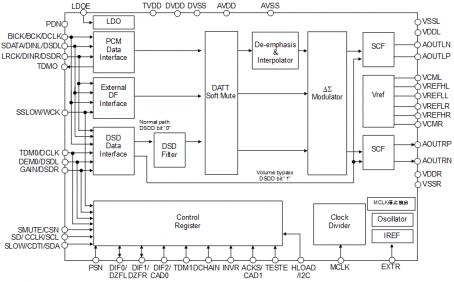Here's a great example to clarify things. This is the block diagram of the new AKM AK4497:

You can see on the left where the PCM data interface and the DSD data interface is.
Let's follow the data path of the PCM first:
First it goes into a "soft mute" this is to eliminate pops and clicks when the internal registers are accessed. From there it goes into the oversampling interpolator where the resource constrained filters are applied. Then to the modulator. Inside the modulator, the data is converted into multibit SDM. It uses the best modulators they could come up with based on the limited power of such a tiny little chip. This is where the digital volume control can be applied. then from there to a filter, and then the analog outs.
Now lets look at what happens when you send it DSD. With DSD there's 2 different options. You can send it through the DSD filter, soft mute, multibit SDM modulator if you want. Or you can bypass all of that stuff. Option 2 completely bypasses all of the resourced constrained SRC/SDM inside the chip altogether, as well as the multibit conversion. It's by far the purest path in the chip. So if you use HQplayer to handle the SDM/SRC with it's far superior SDM/SRC algorithms, you can send all of the data through option 2 of the chip. There's no better way to do it.
Now if you have a Sabre chip, or any other SDM chip (or use option 1 for DSD on the AKM), and send it DSD, it's also better. This is because if you do the SDM/SRC in Hqplayer, it still runs through those blocks, but it doesn't use the modulators because it's already done. It doesn't use the PCM filters either that aren't that great compared to HQplayer because you up sampled to the highest format the chip can process in HQplayer already. It can't upsample higher, so it doesn't do it. So the resource constrained filters are left alone.
However it still does the multibit conversion for the volume control. So if this it your only means of volume control for your system, this is the path you must take. If DSD option 2 was used, you must have an analog volume control somewhere in your system. So now the big choice is what's the lesser of the 2 compromises?
Just remember, by the time the data leaves the modulator, whether it started out PCM, or DSD, it's now the same thing. Only the PCM went through far more processing with inferior filter/modulator algorithms than the DSD did.
















